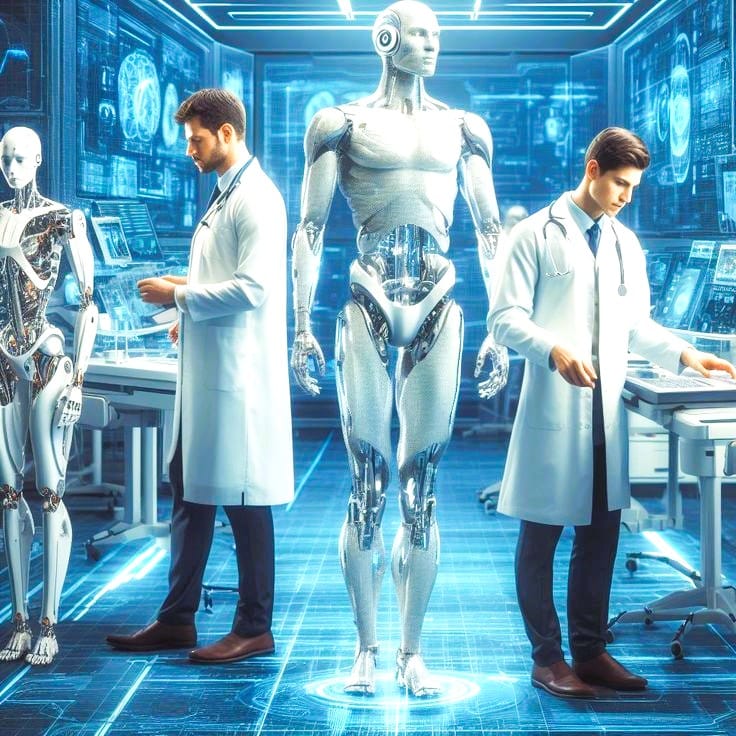AI Meets Medicine is changing the way we approach healthcare, especially in early disease detection. By 2025, AI will help doctors diagnose health conditions earlier and more accurately, leading to better outcomes for patients. Let’s explore how AI is transforming medicine and improving how we detect diseases.

How AI Meets Medicine is Helping in Disease Diagnosis
AI is making a big impact in diagnosing diseases earlier by using advanced technologies to analyze medical data. These are the key ways AI is improving early diagnosis:
1. AI in Medical Imaging
AI is improving how doctors read medical images like X-rays, MRIs, and CT scans. AI algorithms can analyze these images much faster and more accurately than humans alone. This allows AI to spot early signs of diseases like cancer, heart disease, and brain disorders. By catching these conditions early, AI gives doctors a better chance to treat them before they become more serious.
2. Predicting Health Risks with AI
AI doesn’t just diagnose diseases; it can also predict future health problems. By looking at a person’s medical history, lifestyle, and even genetic information, AI can help doctors understand a person’s risk of developing certain diseases. For example, AI can predict the likelihood of someone getting diabetes, heart disease, or even some types of cancer. With this information, doctors can take early action to help prevent these conditions or manage them before they get worse.
3. Finding Rare Diseases with AI
Some diseases are rare and hard to diagnose because their symptoms are often similar to more common conditions. AI can help detect these rare diseases by analyzing patterns in patient data. By using machine learning, AI can spot signs of these diseases more quickly, leading to faster treatment for patients.
Real-Life Examples of AI Meets Medicine in Early Disease Detection
Several organizations are already using AI to detect diseases early. Here are some examples:
AstraZeneca’s MILTON Technology
AstraZeneca has developed a tool called MILTON that uses AI to predict over 1,000 diseases before they are diagnosed clinically. MILTON analyzes health data from large numbers of people to give doctors personalized risk assessments. This allows doctors to take action before the disease develops, helping patients stay healthier.
AI for Tuberculosis (TB) Detection
In places with limited healthcare resources, AI is helping to detect tuberculosis (TB). AI can analyze cough sounds to detect TB, which is often difficult to diagnose in its early stages. This method is quick, simple, and can be used in remote areas where there are fewer doctors or medical tools.
AI for Breast Cancer Risk Assessment
AI is being used to assess the risk of breast cancer by analyzing MRI scans. AI can predict whether a person might develop breast cancer in the next year, allowing doctors to create personalized screening plans. This reduces unnecessary testing for people at low risk while focusing on those who need closer monitoring.
Challenges of AI Meets Medicine in Healthcare
Although AI has great potential, there are some challenges to overcome:
Data Privacy and Security
AI needs access to lots of patient data to work effectively, but this raises concerns about data privacy and security. Healthcare providers must ensure that patient data is kept safe and secure, following strict rules to protect personal information.
Integrating AI into Healthcare
AI tools must be integrated into the healthcare system, which can be complicated. Doctors and healthcare workers need to be trained to use these new technologies, and AI systems must work well with existing medical equipment. This requires both time and investment.
Regulatory Approval
Before AI tools can be used in real-world healthcare settings, they must be tested and approved by regulators to make sure they are safe and effective. This process can take time and might vary depending on the country or region.
What’s Next for AI Meets Medicine in Healthcare?
AI’s role in healthcare is just beginning, and its potential is huge. Here’s what we can expect in the future:
Personalized Medicine
In the future, AI will help doctors create more personalized treatment plans. By analyzing a person’s genetic makeup and other health data, AI will allow doctors to tailor treatments that are more effective and have fewer side effects.
Global Health Impact
AI can make healthcare better around the world, especially in developing countries. AI tools can help detect diseases early, even in places with limited access to medical professionals and equipment. This could improve healthcare for millions of people in underserved areas.
Continuous Improvement
AI systems will continue to improve as they learn from more data. Over time, they will become better at diagnosing diseases, predicting health risks, and recommending treatments. This will make AI an even more valuable tool in healthcare.
Conclusion
AI is revolutionizing early disease detection and changing how we approach healthcare. By helping doctors diagnose diseases earlier, AI improves patient outcomes and gives people a better chance at a healthier life. While there are still challenges to overcome, such as data privacy and system integration, the future of AI in healthcare is bright. As we move through 2025 and beyond, AI will become a standard tool in medical practice, helping doctors provide faster, more accurate, and personalized care.
READ : 10 AI Apps and Websites That Make Your Day-to-Day Work Easy




Your point of view caught my eye and was very interesting. Thanks. I have a question for you.
Thank you for your sharing. I am worried that I lack creative ideas. It is your article that makes me full of hope. Thank you. But, I have a question, can you help me?
I don’t think the title of your article matches the content lol. Just kidding, mainly because I had some doubts after reading the article.
Your point of view caught my eye and was very interesting. Thanks. I have a question for you.
Can you be more specific about the content of your article? After reading it, I still have some doubts. Hope you can help me.
Thank you for your sharing. I am worried that I lack creative ideas. It is your article that makes me full of hope. Thank you. But, I have a question, can you help me?
Your point of view caught my eye and was very interesting. Thanks. I have a question for you.
Can you be more specific about the content of your article? After reading it, I still have some doubts. Hope you can help me.
Your point of view caught my eye and was very interesting. Thanks. I have a question for you.
Thanks for sharing. I read many of your blog posts, cool, your blog is very good.